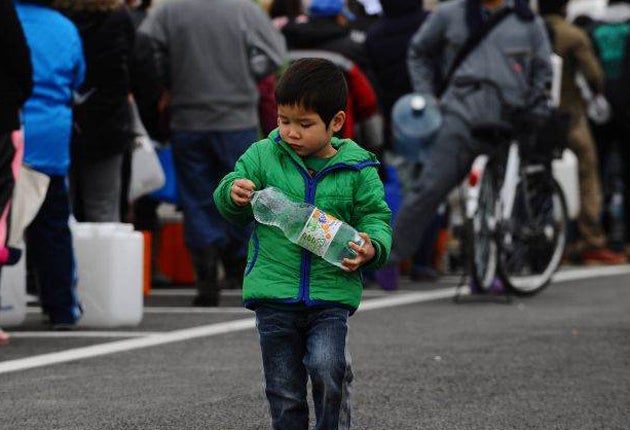Babies at risk from tainted tap water, Tokyo parents warned

Your support helps us to tell the story
From reproductive rights to climate change to Big Tech, The Independent is on the ground when the story is developing. Whether it's investigating the financials of Elon Musk's pro-Trump PAC or producing our latest documentary, 'The A Word', which shines a light on the American women fighting for reproductive rights, we know how important it is to parse out the facts from the messaging.
At such a critical moment in US history, we need reporters on the ground. Your donation allows us to keep sending journalists to speak to both sides of the story.
The Independent is trusted by Americans across the entire political spectrum. And unlike many other quality news outlets, we choose not to lock Americans out of our reporting and analysis with paywalls. We believe quality journalism should be available to everyone, paid for by those who can afford it.
Your support makes all the difference.Japan's spreading nuclear contamination has reached the water supply of the world's largest metropolis, prompting the government to advise against giving tap water to babies.
Yesterday's warning by Tokyo governor Shintaro Ishihara sparked a run on bottled water in the stores and sent thousands of worried parents to the website of the capital's Bureau of Waterworks, briefly crashing the site.
"I bought a case of bottled water because I use it to wash dishes and boil rice," said Tokyo mother Yuko Kobayashi, who has a one-year-old son. "We're just settling back to normal after the earthquake and now we have to think all the time about radiation. It's psychologically exhausting."
Tokyo's move follows a series of indefinite bans this week on over a dozen food items produced in and around Fukushima Prefecture, home to a stricken six-reactor nuclear plant that has been leaking radiation on and of for nearly two weeks after the massive earthquake and tsunami on 11 March.
Yukio Edano, Japan's top government spokesman, called the contaminated water "unfortunate" and said rain yesterday meant the radiation could have "an impact on many areas". But he said the warning on water was a precaution. "Even if consumed several times, it would have no harmful effects on human health even in the future."
Some experts have also played down the impact of the radiation on the country's food supply. "Perhaps if you were drinking 20 litres a day, in which case you'd die of water intoxication, it could be a problem," said Robert Gale, a specialist in nuclear accidents who is in Tokyo visiting the Fukushima Daiichi plant.
There are worries that public concern about the Fukushima crisis is distracting attention from the effort to help around 500,000 people left homeless by the earthquake and tsunami. The disaster killed 9,500 people and another 15,600 are missing. Hundreds of thousands of homes are still without water or electricity.
But the radiation warnings are jangling nerves in a country suffering aftershocks and struggling to recover from its worst disaster since the Second World War. Yesterday began with more tremors, taking the number of aftershocks to more than 100. And rain showers in Tokyo last night prompted some residents to warn each other to use an umbrella to protect themselves from potentially contaminated rainwater.
In this climate of fear and uncertainty, many are angry over a series of claims this week that the radiation levels are "safe".
"Radiation in Tokyo is not something I would panic about, but it is certainly not the kind of radiation you want to receive for the whole year," said Satoko Norimatsu, who heads the Vancouver-based NGO Peace Philosophy Centre.
Japan's Health Ministry has already advised parents in Fukushima Prefecture against using tap water to make baby formula. Yesterday's fresh warning in the capital follows the discovery of over twice the legal levels of radioactive iodine in a water treatment plant.
Higher-than-normal radioactivity has also been detected in seawater around the damaged plant, though the government says there are no plans yet for a seafood ban.
Workers have been battling to bring four badly damaged reactors at the Fukushima complex under control since the plant's cooling systems were knocked out by the quake and tsunami. The government says the workers have made progress cooling the reactors but they were forced to withdraw again yesterday after smoke poured out of No. 3 reactor. Japan's nuclear safety agency said the smoke did not contain large quantities of radioactivity.
Join our commenting forum
Join thought-provoking conversations, follow other Independent readers and see their replies
Comments